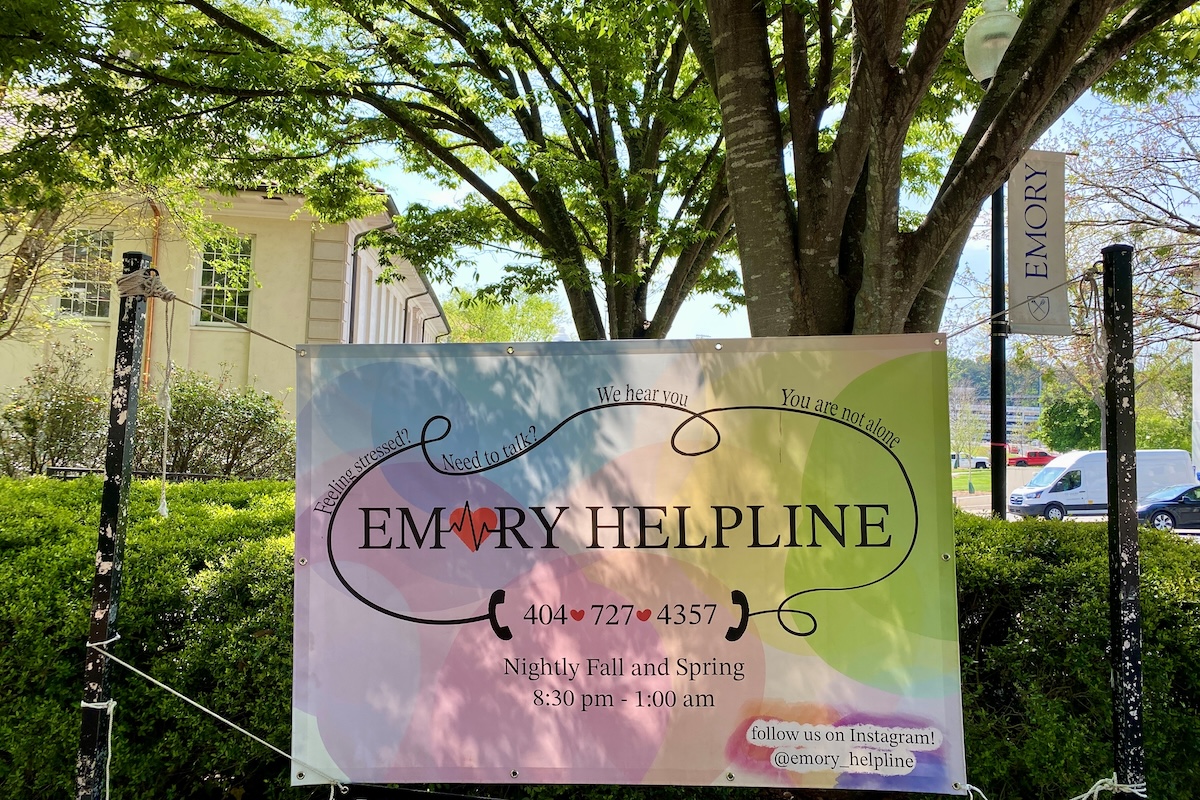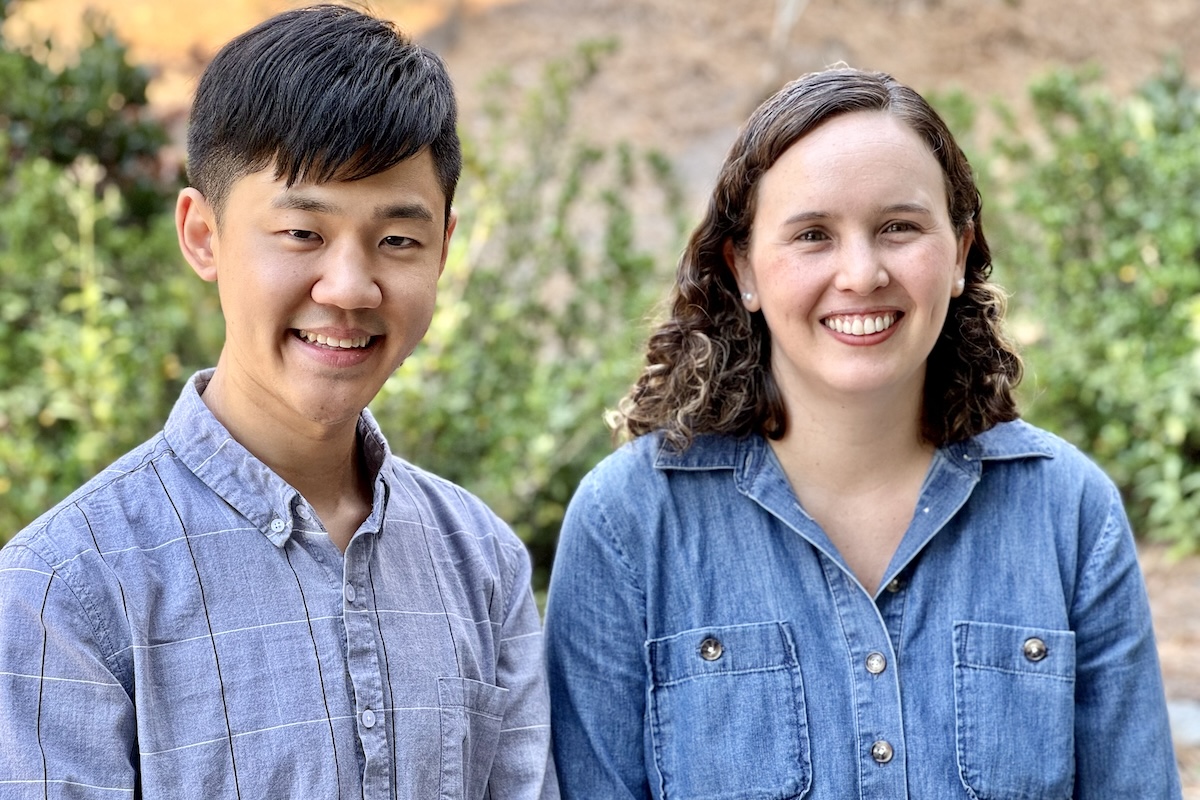Decades before the nation’s colleges and universities regularly discussed collegiate mental health concerns, Emory Helpline began delivering support to students who are struggling.
Helpline is a confidential telephone line operated by student volunteers trained and advised by staff from Emory’s Counseling and Psychological Services (CAPS), part of Emory Campus Life. Now celebrating its 45th anniversary, the student-run volunteer organization continues to provide paraprofessional peer support for generation after generation of Emory community members.
“Helpline supports students coping with various concerns,” says Irene Daboin Dominguez, a licensed psychologist, Helpline’s staff advisor and CAPS’ interim senior coordinator of outreach and suicide prevention. “It provides vital peer-to-peer support, a proven approach to supporting the mental health of college students.”
Helpline began in 1979 as a collaboration between the dean of students along with psychology department graduate students and faculty members before Emory had a counseling center. The effort subsequently inspired creation of the center.
Today, Helpline operates 8:30 p.m.-1 a.m., including weekends, during fall and spring semesters. The line closes for summer, when most students are away from campus.
The program has averaged more than 100 calls annually during the past decade, with most calls from self-referrals and typically lasting 20-30 minutes each. Caller concerns range from relatively low-risk academic and interpersonal issues to high-risk crises involving suicidal ideation. The safety of high-risk callers is prioritized with specific protocols and limits to confidentiality.
Although Helpline is unique and important, Daboin Dominguez emphasizes it is only one of Emory’s many tools for addressing students’ mental health needs — one component of a network of programs and services that CAPS makes available to all Emory students.

Ensuring trustworthy support
Helpline volunteers undergo a thorough application and interview process, then are required to successfully complete a semester-long, non-credit course and training program. Throughout their service, they participate in weekly group meetings with Daboin Dominguez.
The number of active volunteers ranges from 10-25 per semester, with each student typically contributing five-10 hours a week to Helpline. In addition to taking phone calls, they help expand awareness of the program and related issues through tabling events, fundraisers and social media. Although Helpline asks volunteers to commit at least one semester to the program, some stay for as many as three years.
To promote rapport and the caller’s sense of privacy, volunteers taking calls remain anonymous throughout their period of service with Helpline. Volunteers do not receive compensation or public recognition.

Jonathan Kim (left) is a former Helpline volunteer and executive board member. Irene Daboin Dominguez, a licensed psychologist, is the Helpline’s staff advisor and CAPS’ interim senior coordinator of outreach and suicide prevention.
Growing through their Helpline volunteer experience
“Helpline teaches skills through training and experience that volunteers can put to real, tangible practice,” says Jonathan Kim, an alumnus and former Helpline volunteer and executive board member, who is now a clinical research coordinator with the Emory University School of Medicine.
“I became familiar with terms such as active listening, crisis de-escalation, the QPR [question, persuade and refer] method and other techniques fundamental to practicing psychology,” Kim says. “Just as important, my experience as a Helpline volunteer has given me a community of other former volunteers who still maintain an inclusive and fostering support system.”
Research suggests that most former Helpline volunteers agree with Kim.
In 2022, the organization sent a confidential survey to 174 former Helpline volunteers who served from 1997-2020. Of the 74 respondents, 91% reported that skills they learned as Helpline volunteers were useful beyond their service with the program. One wrote that Helpline taught “active-listening skills and empathy that I continue to use in my profession every day.”
More than four in 10 survey respondents (44.5%) reported that volunteering for the Helpline service influenced their day-to-day self-care.
“I learned more techniques for grounding myself and incorporated more breathing into my self-care,” alumna Adina Peck says of her time as a Helpline volunteer. “Journaling and self-compassion were other techniques I practiced more often because of my time with Helpline.”
In addition, 72% of survey respondents reported that Helpline service influenced career decisions. One wrote that it “piqued my interest in the mental health field and encouraged me to take my first post-graduation job with the National Institute of Mental Health.”
Another respondent explained, “I got a taste of clinical experience and went on to earn a doctorate in clinical psychology. Today, I’m a therapist in private practice.”
Joanna Kaye, director of the Anxiety, Trauma and OCD Center of San Diego, explains that Helpline volunteer service “helped reinforce my decision to choose a clinical psychology graduate program with excellent clinical training rather than a primary emphasis on research.”
Most respondents (88%) agreed that Helpline participation enriched their overall Emory experience and 84% that it helped them feel a greater sense of belonging in the university community.
“I cherish the Helpline. It was my favorite activity at Emory,” says Kaye. “My engagement helped me feel more connected to the broader Emory community — and I think Helpline’s existence sends a message to members of the Emory community that other community members are ready to listen and offer support.”
Kim agrees. “The Helpline is a hub of empathy and listening led by student volunteers. It’s a beacon of hope that reaffirms to Emory students that they matter and belong,” he says. “And students who know they matter and belong are students who can flourish.”
Emory’s network of support for student well-beingEmory offers a robust range of options for mental health services to support the student community:
Please note that these resources are not mutually exclusive; any student may find that a combination of support resources works best for them. Visit the CAPS website to learn more about Emory’s mental health resources for students on the Atlanta campus. Contact CAPS by calling 404-727-7450. On the Oxford College campus, the Center for Counseling and Wellbeing is available Monday-Friday, 8:30 a.m.-12 p.m. and 1-5 p.m.
While a valuable resource, calling the CAPS phone line (404-727-7450) for immediate support is not a replacement for ongoing clinical mental health assistance. Students needing immediate assistance for an emergency should call the Emory Police Department at 404-727-6111 on the Atlanta campus. For emergency help off campus, but in the U.S., call 911. Additional resources Emory Helpline: 404-727-4357 (HELP) 988 Suicide and Crisis Lifeline: https://988lifeline.org/ |

